Archana Shukla Solutions for Chapter: Electric Current and Circuit, Exercise 6: EVALUATE
Archana Shukla Science Solutions for Exercise - Archana Shukla Solutions for Chapter: Electric Current and Circuit, Exercise 6: EVALUATE
Attempt the free practice questions on Chapter 3: Electric Current and Circuit, Exercise 6: EVALUATE with hints and solutions to strengthen your understanding. Wow Science Hands-on Learning in Science 6 solutions are prepared by Experienced Embibe Experts.
Questions from Archana Shukla Solutions for Chapter: Electric Current and Circuit, Exercise 6: EVALUATE with Hints & Solutions
Observe the given electric circuits and answer the questions asked.
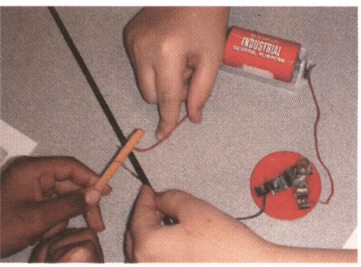
Kids are using wood to connect wires. What would happen? Give a reason for your answer.
Observe the given picture.

How do they differ from each other?
Observe the given picture.

Are they similar in any way?
Look at the given picture and answer the questions asked.
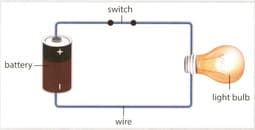
What would happen if the negative terminals of both the cells are in contact?
Look at the given picture and answer the questions asked.
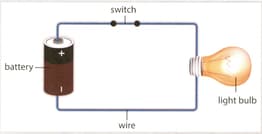
What would happen if the electric wire is changed with a plastic wire? Give reason.
Look at the given picture and answer the questions asked.
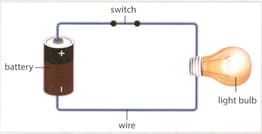
What are the necessary conditions for an electric circuit to work?
Manoj sets up a circuit as shown below.
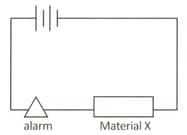
In the following table, put a tick in the boxes for the material (X) that will cause the alarm to sound.
| Material X | Will the alarm sound? |
|---|---|
| Aluminium rod | |
| Zinc plate | |
| Carbon rod | |
| Rubber sole | |
| Glass bottle |
Identify the property that the material 'X' must possess to sound an alarm.
Vedant sets up a simple electric circuit as shown here.

He then tested the circuit using rod ‘p’ and observed if the bulb lit up. He then repeated the experiment using other rods ‘Q’ and ’R’. He placed each rod near some paper clips and observed if the rod attracted the paper clips. He recorded his observations as shown below.
| Rod | Bulb lit up | Attracted paper clips |
| P | X | X |
| Q |  |
 |
| R |  |
X |
Which of the following materials could have been used to make rods P, Q, and R?
|
Rod P |
Rod Q |
Rod R |
|
| a | Metallic | Non-metallic | Metallic |
| b | Non-metallic | Metallic | Metallic |
| c | Non-metallic | Non-metallic | Metallic |
| d | Non-metallic | Metallic | Non-metallic |
